Published 24 September 2020
A poll we conducted shows a strong bipartisan approval of "Buy American" federal procurement policies. We also find that the Trump’s Administration’s focus on trade policy may have elevated the importance of this issue among many voters, particularly among Republicans.
TradeVistas’ September poll shows overwhelming support for “Buy American” policies, while one in four Americans – and nearly 1 in 3 Republicans – say trade is “the most important issue” in their vote for president this election cycle.
“Buy American” is likely to be a prominent campaign theme this fall as Republican President Donald Trump and Democrat party candidate Joe Biden sketch out their plans for reviving the US economy in the midst of a pandemic.
Biden’s aggressive “Buy American” agenda proposes major investments in federal procurement and infrastructure to support domestic manufacturing. Trump, meanwhile, has made “Buy American” a cornerstone of his Administration. After campaigning in 2016 to bring back US jobs lost to global competition, Trump has levied tariffs on foreign steel and aluminum, launched a trade war against China and issued executive orders aimed at ensuring that US companies were the federal government’s preferred suppliers.
TradeVistas’ September poll of 1,003 adults, conducted by Lincoln Park Strategies, shows strong support for “America First” approaches like "Buy American." Our survey shows strong bipartisan approval of Buy American federal procurement policies, which a plurality of Americans say would create large numbers of jobs. Americans also say they support "Buy American" in their personal spending, with a slight majority saying they’d pay a premium for US-made goods. Finally, we find that the Trump’s Administration’s focus on trade policy may have elevated the importance of this issue among many voters, particularly among Republicans and likely Trump voters.
1. Big support for “Buy American”
Overall, three out of four Americans (75 percent) say they support "Buy American" policies requiring the federal government to buy from domestic suppliers whenever possible.* Nearly half – 48 percent – say they “strongly support” the policy, while just 5 percent of Americans say they are either “somewhat” or “strongly” opposed, while 21 percent were “indifferent.”
Majority support was consistent across education, race and income, but was strongest among self-described Republicans, 70 percent of whom “strongly support” the policy (compared to 40 percent of Democrats and 37 percent of Independents). Among likely voters, 68 percent of those planning to vote for Trump also said they “strongly support” "Buy American," compared to 41 percent among likely Biden voters and 39 percent among those who were undecided. Men were also more likely to be women to be strong supporters (56 percent versus 41 percent).
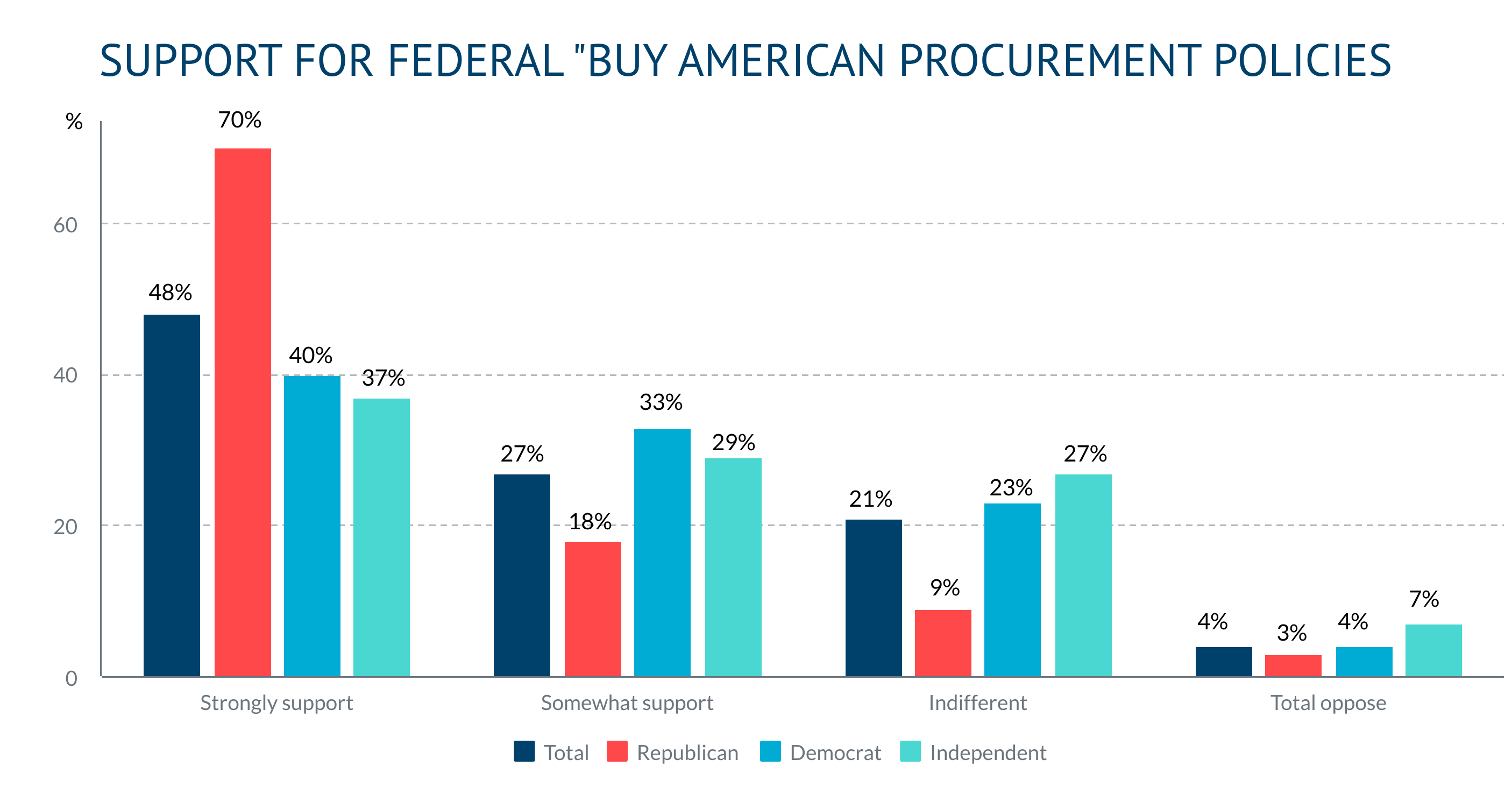
2. Strong belief that “Buy American” policies generate jobs
While some prominent economists have criticized "Buy American" policies as counterproductive and potentially even leading to the loss of US jobs, respondents in our survey believe the opposite. Nearly 4 in 5 respondents (79 percent) say "Buy American" procurement policies would create jobs, including 41 percent who say it would create “a large number of jobs” and 38 percent who say it would create “some new jobs.” Again, this support was consistent across race, education and income.
Democrats were more skeptical than Republicans, however. While 60 percent of Republicans said Buy American would create many jobs, 36 percent of Democrats said the same. (However, only 2 percent of Democrats said the policy would “hurt American jobs.”) Similarly, likely Trump voters were more likely to say Buy American would create large numbers of jobs compared to likely Biden voters (59 percent versus 31 percent). Undecideds fell in the middle with 42 percent.
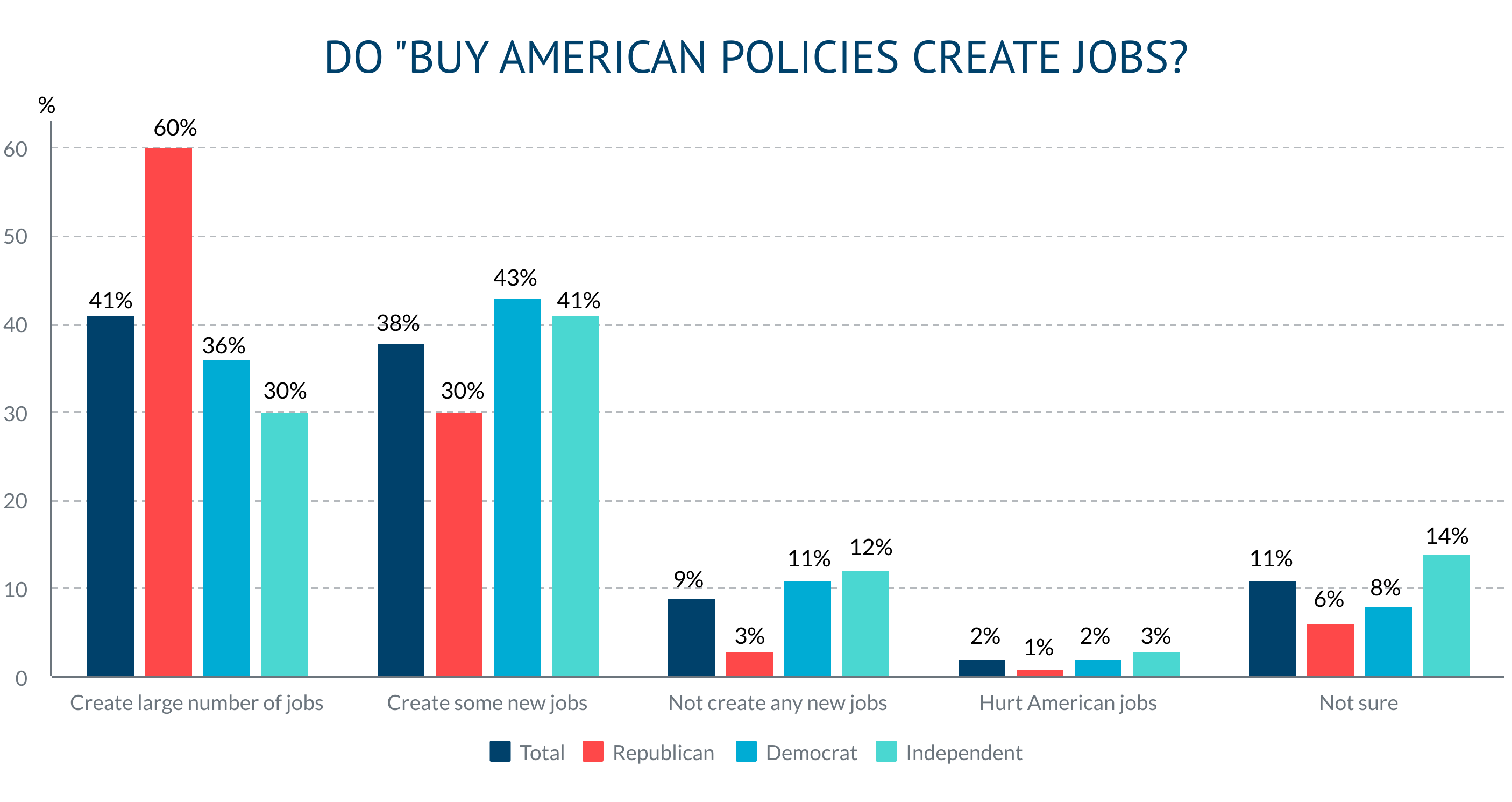
3. Americans would pay more to "Buy American" themselves
Americans in our survey seem to support "Buy American" as a broad statement of economic patriotism and would pay more to buy US-made goods.
Twenty-five percent of respondents in our survey said they would choose an American-made good over a comparable foreign product “regardless of cost,” while 31 percent say they would pay a 10 to 20 percent premium. Another 25 percent said they would buy the US product if it were the same price as a comparable item, while 9 percent said they would purchase the cheaper product, and 10 percent were unsure.
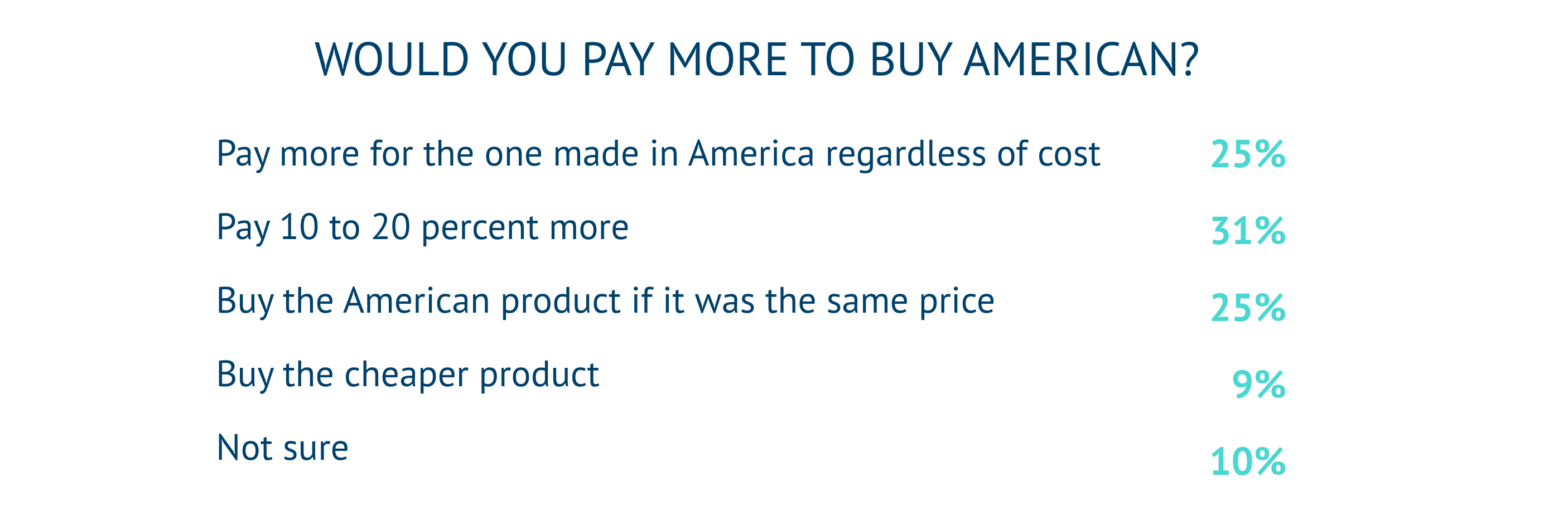
These results run counter to earlier surveys finding that while the majority of Americans believe it important to buy US products, they are less willing to pony up a premium. A 2017 Reuters/Ipsos poll, for instance, found that while 70 percent of Americans think if “very important” or “somewhat important” to buy US goods, 37 percent said they would not pay more for an American product, while 26 percent said they would pay only up to 5 percent more.
One potential explanation for our results is negative shifting consumer sentiment toward products made in China. A 2020 survey by FTI Consulting, for instance, found that 40 percent of Americans say they won’t buy Chinese-made goods.
Our survey found significant partisan differences over buying American, which indicate a solidification of views likely prompted by Trump. While 46 percent of Republicans said they would buy American regardless of price, just 18 percent of Democrats said the same (although 32 percent of Democrats also said they would be willing to pay a 10 to 20 percent premium). The starkest difference, however, was between Republican men and Democratic women. While 52 percent of Republican men said they would buy American regardless of cost, only 14 percent of Democratic women said they would do so.
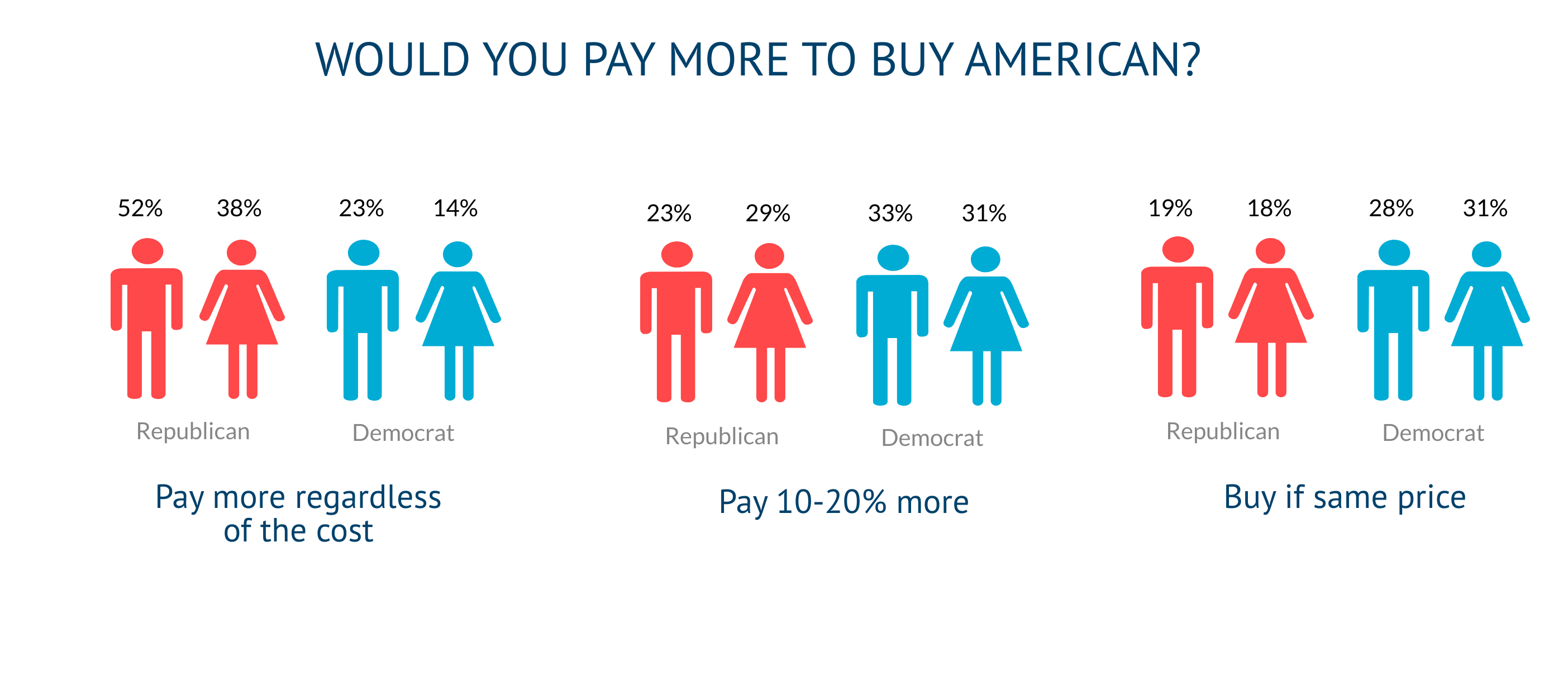
4. Trade as a crucial election issue for key sets of voters
Partisan enthusiasm for "Buy American" may also translate into the elevation of trade as an election issue for many of the respondents in our survey. Overall, 19 percent of total respondents said a candidate’s position on trade is “the most important issue to me,” while 25 percent said trade is “one of the most important issues” determining their vote for president.
These figures, however, mask significant partisan differences in how likely voters view the importance of trade. For instance, while 66 percent of Republicans in our survey said trade was the most important or among the most important issues to them in their vote for president, half as many Democrats (33 percent) felt the same. Similarly, while 64 percent of likely Trump voters said trade was the most important issue or among the most important election issues to them, 62 percent of likely Biden voters said trade “is important but will not have an effect on my vote” or is “not an issue I really care about.” Trade does, however, seem to matter for undecided voters in our poll; 59 percent considered the issue to be the most important or among the most important in their vote for president.
These results mirror findings showing sharp partisan differences in the issues that matter most to voters this fall. The Pew Research Center, for instance, finds that while the economy is the top concern of Trump voters, Biden supporters are the most concerned about health care and the pandemic. For many Republicans and Trump supporters, the interest in trade policy is likely a proxy for this broader concern over the economy.
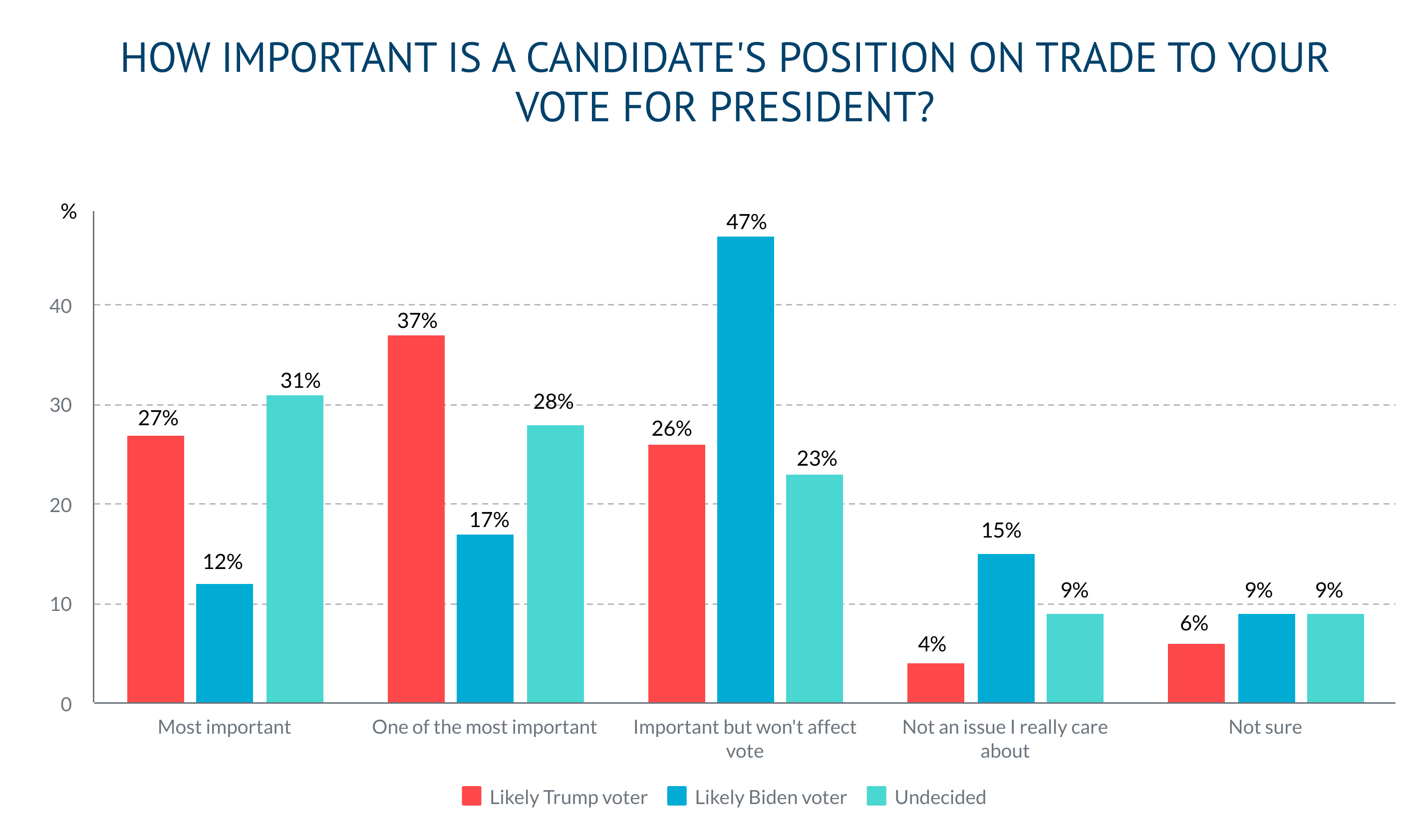
“Buy American” has always made for good politics, tapping into Americans’ strong sense of economic patriotism. But there are a couple reasons why American sentiment toward buying American might be especially strong today, even aside from the particular focus on US production by President Trump.
For one thing, the coronavirus pandemic exposed major weaknesses in global supply chains, reinforcing concerns about US over-reliance on foreign imports, particularly for medicines, medical equipment and other vital products. Boosting domestic production and manufacturing will also be crucial to America’s post-pandemic recovery. So long as millions of Americans remain under-employed or unemployed as a result of COVID-19, federal investment in domestic production or infrastructure could help put Americans back to work.
Given both political parties’ embrace of "Buy American," it will be a priority regardless of who wins the White House in November.
***
*Note: While our survey sought to measure Americans’ perspectives on “Buy American” as a matter of federal policy, we realize that Americans are likely to interpret “Buy American” more broadly, to include personal spending decisions as well as those by the government. Politicians have also added to the confusion by using the phrase “Buy American” to show support for domestic manufacturing and production generally.
Methodology: 1,003 interviews among adults age 18+ were conducted by Lincoln Park Strategies from September 10-12, 2020 using an online survey. The results were weighted to ensure proportional responses. The Bayesian confidence interval for 1,000 interviews is 3.5, which is roughly equivalent to a margin of error of ±3.1 at the 95% confidence level.
© The Hinrich Foundation. See our website Terms and conditions for our copyright and reprint policy. All statements of fact and the views, conclusions and recommendations expressed in this publication are the sole responsibility of the author(s).




